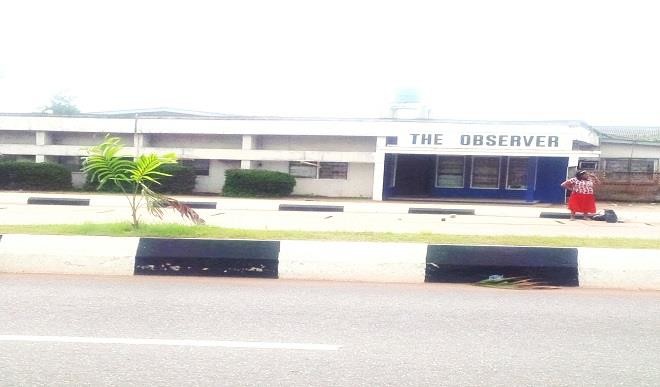The Nigerian Observer: Surviving on past glory
The Nigerian Observer Newspaper produced by the Edo State government has defiled all odds to still be on the newsstand till date. Most government newspapers that were established within the same period have since gone into oblivion. Though its area of coverage and the daily circulation are limited, it still meets its obligation of informing […]


The Nigerian Observer Newspaper produced by the Edo State government has defiled all odds to still be on the newsstand till date.
Most government newspapers that were established within the same period have since gone into oblivion.
Though its area of coverage and the daily circulation are limited, it still meets its obligation of informing and educating its public.
In the past, the medium was reckoned with in the country, as it competed and outshone many other government-owned newspapers of its generation. But, as it now, the newspaper is leveraging on the euphoria of its past.
Daily Trust on Sunday gathered that back in the day, the newspaper was read all over the country, but at the moment its coverage is restricted to the state and its environs and sometimes circulated in certain areas of the Federal Capital Territory.
Despite the difficulties faced by media houses in the country in terms of acquiring newsprint, the state government ensures that the newspaper is printed daily.
A source told Daily Trust on Sunday that the newspaper now prints limited copies with many copies given out as complementary, mainly to government officials and offices.
Major challenges facing the newspaper, according to findings, include obsolete machines and shortage of staff.
However, worthy of note is the fact that despite these challenges, the staff are not being owned salaries like other civil servants in the state.
Since it was established in May 29, 1968 by the then Brigadier-General Samuel Ogbemudia -led military government, the only time it was off the newsstand was when it was proscribed during the regime of former Head of State, General Sani Abacha.
The newspaper’s popularity started declining with the proliferation of private newspapers in the country, as patronage shifted from government media to privately-owned ones.
A former staff of the organisation, who craved anonymity, lamented that the media house has not received any special attention since 1999, as it has been neglected by successive governments.
The ex-staff said in the past the newspaper was famous and competed favourably with the likes of the Daily Times and New Nigerian, but that things are no longer the same.
The former staff noted that the newspaper depends on the government for virtually everything because the commercial department which ought to have been generating funds to complement subvention is not functioning.
He said: “…and the paper is short of staff because most of the casual workers under the Edo State Youths Empowerment Scheme (EDO-YES), the now defunct poverty alleviation interventionist agency of the government, were sacked.”
Another former staff said the newspaper is only living on past glory.
“At a time, the newspaper had an aircraft that was circulating copies across the country,” he said.
He lamented that everything about the paper, including environment, printing, circulation, machines and number of copies have continued to decline.
Efforts to speak with the General Manager of the organisation, Mr. Monday Aigbe, were unsuccessful as he declined comments, and directed all inquiries to the Information Commissioner.
The Edo State Commissioner for Information, Kassim Afegbua, on his part, said government was concerned about the newspaper. He maintained that in the past no government paper could compete with the Nigerian Observer.
He said: “The Observer was more popular than all government- owned newspapers. As part of efforts to reposition the paper, the government has confirmed the General Manager who was on acting capacity and he has been advised by the board to come out with a workable template that is result-driven.”
Afegbua promised that the incoming government which according to him will be of the All Progressives Congress (APC) stock, would continue from wherever the present administration stops to make the newspaper viable. The commissioner noted that the administration inherited challenges in virtually all sectors of the state economy and “cannot do everything”.
He said the present administration prioritised education, health, infrastructure and security.
“The story of the newspaper is indeed a long one, but credit must go to the state government and its people that sustained public concern irrespective of the fact that it is no longer attractive for government to own and run newspapers”, h added.
